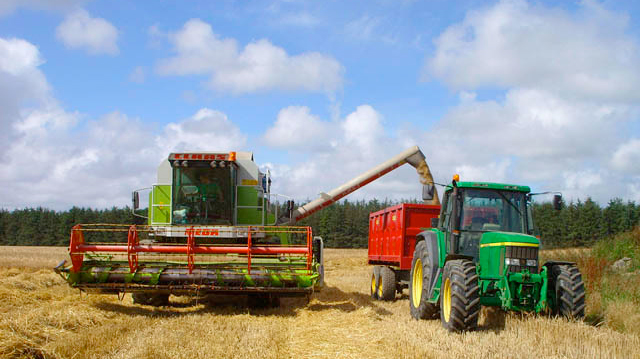
Scotland’s 2015 cereal harvest is expected to be the best in 20 years in terms of yields. Scottish farms are estimated to produce 3.3 million tonnes of cereals this year, including two million tonnes of barley and one million tonnes of wheat.
Scotland’s Chief Statistician today released the first estimates of the 2015 Scottish cereal and oilseed rape harvest.
The figures show that the latest increase in production is due to an anticipated five per cent improvement in overall cereal yields over the past 12 months.
The total area of land sown has decreased by four per cent, with 443,000 hectares grown in 2015. Overall yields are expected to average around 7.3 tonnes per hectare; ranging from 6.2 for spring barley to 9.7 for wheat. Oilseed rape yields are expected to average around 4.2 tonnes per hectare.
The longer term trend of improving yields continues, with the average cereal yield for the last 10 years seven per cent higher than in the previous decade.
Early estimates of the Scottish harvest come from the Scottish Government’s annual Crop Report Meeting. Industry experts attending the meeting reported high production volumes but raised concerns over grain quality, with a high prevalence of grain skinning in spring barley and oilseed rape crops. The 2015 harvest was late to start and, once underway, was halted several times by poor weather conditions. The weather conditions restricted crop development during the essential growth period which contributed to reduced grain quality in some cases.
Spring barley is the only major cereal crop to see reduced production this year, with wheat replacing barley in some areas. While Scottish maltsters have relaxed quality margins to accept more of the Scottish crop, it is anticipated that there will be greater use of barley as animal feed this year. High moisture content in parts of the country may also lead to an increase in whole cropping which makes estimating production levels harder.
Oats have seen the largest estimated rise in production, increasing by around 17 per cent to 180,000 tonnes. Just over a million tonnes of wheat, up from 990,000 tonnes, and around 430,000 tonnes of winter barley, up from 410,000 tonnes, are expected. Oilseed rape crops have seen a small production rise from 148,000 to 151,000 tonnes. Spring barley production is expected to fall by around 100,000 tonnes to 1.57 million tonnes.
Scottish cereals are still being harvested and these figures are very much provisional estimates. Final harvest estimates from the Cereal Production Survey will be announced by Scotland’s Chief Statistician in December. Final estimates of overall cereal production are typically within five percent of the early estimates.
The figures released today were produced by independent statistical staff in accordance with professional standards set out in the Code of Practice for Official Statistics. These early statistics are used to assess the economic well-being of the cereal sector and in determining impacts on the market.
